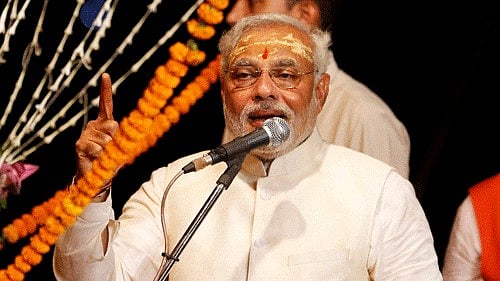
PM Narendra Modi.
Credit: PTI
Big Brother is no more the elder. This paradox is particularly true about the ‘First Family’, or first parivar of India’s political theatre. To gain a deeper understanding, specifics are required.
At 9.30 am on March 19, 1998, Atal Bihari Vajpayee was sworn in as Prime Minister by President K R Narayanan along with 21 Cabinet ministers and another lot of the same numbers as ministers of state.
The previous night, he sat down for dinner at home only after concluding a marathon session with Lal Krishna Advani, during which they drew up the list of those who would take oath as Cabinet and state ministers. Advani left for his home only after the list was sent to the President of India.
For hours, closeted in a room, the two scrawled names, struck some out after consultations, overwrote other names, restored previously struck out names, and finally, after much nodding and shaking heads, the list of names satisfied both leaders.
Aides gave formal shape to the sheet of scrawls. More changes, this time in the order of names, were then made. Eventually, the final letter to the president was ready.
Aides were despatched to the Rashtrapati Bhawan to hand over the list to Gopalkrishna Gandhi, secretary to the president. In that list, Jaswant Singh’s name was in third position after Vajpayee and Advani.
Singh had lost from the Chittorgarh constituency in Rajasthan. But, he couldn’t be kept out because Vajpayee and Advani depended heavily on him for networks at home and abroad.
Barely had dinner been served than K S Sudarshan, formally number two in the Rashtriya Swayamsevak Sangh (RSS) but already de facto chief due to Sarsanghchalak Rajendra Singh (Rajju Bhaiyya)’s declining health, drove to Vajpayee‘s residence past the horde of camerapersons waiting at the gate. He left 45 minutes later, leaving a distressed Vajpayee behind.
He dictated another short letter to Gandhi, this time requesting that Singh’s name be dropped. The rest is history. Big Brother demonstrated its power and had swadeshi-friendly Yashwant Sinha as Union finance minister. The visit did not remain a secret, and everyone learnt that the final choice was made by the RSS.
Cut to 2013, the stock value of Manmohan Singh’s government was rapidly declining while that of the Bharatiya Janata Party (BJP) rose. But, who would lead the challenger? Whose name would the RSS, with Mohan Bhagwat at the helm now, endorse?
At a meeting in Delhi, although Rajnath Singh was elected BJP president to replace Nitin Gadkari, the loudest cheers were for Narendra Modi, not much loved by the Delhi-based leadership. “I realised then, how far we had been left behind by Narendra Bhai,” late Bihar Deputy Chief Minister Sushil Modi, also an aspirant for being named as the party’s prime ministerial candidate, told me in December 2017.
Bhagwat too realised that. Worse, he sensed a ‘revolt’ from below if the RSS anointed someone else. Big Brother relented and ‘cleared’ Modi’s name as the BJP’s electoral mascot, and in the process, agreed to step down to become a twin to Modi.
The centenary celebrations of the RSS were preceded by yet another episode of RSS-BJP schism. It majorly factored in the BJP’s failure to secure a majority in the 2024 Lok Sabha elections. Not for the first time, the famed RSS network remained ‘indifferent’ to the BJP’s prospects and did an alleged ‘no-show’ during the campaign.
For the RSS, the sanghathan (organisation) always had primacy over the vyakti (individual). Not so in Modi’s ‘I-me-myself’ framework.
Previously too, Modi worked with complete functional autonomy as Gujarat chief minister, rarely turning towards the RSS when single-handedly taking key decisions, ensuring detractors were ejected from the state, and reducing the BJP unit to being a mere appendage.
The RSS knew in 2013-2014 that little would change after he shifted to 7 Lok Kalyan Marg. From the BJP’s helm and as prime minister, he has never turned to the RSS for consultations. Over the past 11 years, the party and government have remained under his thumb.
Of course, Big Brother had his moments of glory. For instance, when Modi sang a paean for the RSS during his Independence Day Speech from the Red Fort. Or when he visited Nagpur in March to pose for a picture of togetherness with Bhagwat.
The centenary year ushers in major existential questions for the RSS. It has had the benefit of Two-Ps — its programmes and policies being unceasingly implemented by Modi, and ensuring placements for individuals drawn from the saffron ecosystem in every conceivable institution across sectors.
Little is likely to change as long as Modi remains in office. The RSS takes a long-term view of issues. Will it conclude at some point, that support for Hindutva has crossed the threshold, and no longer depends on an individual’s charisma to retain a stranglehold?
If Big Brother ‘accepts’ playing second fiddle, will it ever be able to play elder again, even in the post-Modi era?
Nilanjan Mukhopadhyay is a journalist and author of ‘Narendra Modi: The Man, The Times’ and ‘The RSS: Icons of the Indian Right’.
Disclaimer: The views expressed above are the author's own. They do not necessarily reflect the views of DH.
Read more at: https://www.deccanherald.com/opinion/palestine-needs-more-than-a-stamp-of-statehood-3747453